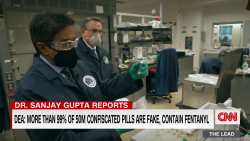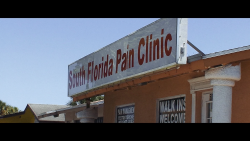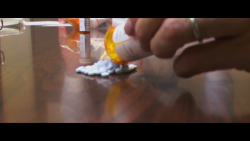Story highlights
An emergency declaration could have "immediate impact" on opioid crisis, expert says
Expert asks, will the declaration "be used for good or for ill?"
Last Mondaythe White House commission examining the nation’s opioid epidemic, headed by New Jersey Gov. Chris Christie, released its interim report that says President Donald Trump should declare an emergency because “our citizens are dying.”
The recommendation that Trump declare a national public health emergency over the growing opioid crisis is long overdue and a welcome relief, according to medical professionals and those battling the epidemic on the front lines. But some worry the administration may not follow through on campaign promises to address the opioid crisis, and they express concern that the recent evidence-based treatment recommendations are at odds with the Justice Department’s new war on drugs.
More controversy swirled after it was reported that Trump labeled New Hampshire “a drug-infested den,” in a conversation with Mexican President Enrique Peña Nieto, according to a transcript of Trump’s January 27 call that was published by The Washington Post. In 2015, New Hampshire recorded 397 deaths caused by opioids, according to the New Hampshire Department of Safety. In terms of the rate of all drug-related deaths, New Hampshire ranks second among states behind West Virginia, according to the most recent data available from the CDC.
Of the White House commission’s recommendation, “I was really pleased to see the news. It’s overdue,” said Dr. Guohua Li, a professor of epidemiology and anesthesiology at Columbia University who has been studying the epidemic for over a decade. “If the president declares the opioid epidemic as a national public health emergency, it means every state health department, local government and the federal government would treat this as the top priority.”
An emergency declaration would provide an influx of logistics, funding and public policy initiatives in communities across the country, which Li says “could have an immediate impact for the better.”
It is not often that a public health emergency is declared for something other than a natural disaster. The US Department of Health and Human Services declared one in Puerto Rico last year after more than 10,000 Zika cases were reported there. Before that, the last emergency declaration, unrelated to a natural disaster, was during the 2009-10 flu season, when there was widespread concern over a potential pandemic.
But Li noted that the opioid epidemic is much different. “In previous health emergencies, the president declared an emergency based mostly on the potential threat of an infectious epidemic,” he said. “But this one is a reality, and it’s been getting worse for more than 15 years. The second important difference is that the opioid epidemic is a man-made epidemic – and maybe for the first time, a man-made epidemic has reached this proportion.”
Since 1999, the number of American overdose deaths involving opioids has quadrupled, the Centers for Disease Control and Prevention says. From 2000 to 2015, more than 500,000 people died of drug overdoses, and opioids account for the majority of those. The commission said 142 Americans die from drug overdoses every day – a toll “equal to September 11th every three weeks.”
In addition to the emergency declaration, the commission recommends rapidly increasing treatment capacity for those who need substance abuse help; establishing and funding better access to medication-assisted treatment programs; and equipping all law enforcement with naloxone, the opioid antidote used by first responders to save lives.
Dr. Arthur Reingold, a professor of epidemiology at the University of California-Berkeley, worked with the World Health Organization on giving advice and helping stockpile vaccines during the H1N1 pandemic in 2009. It was that type of global initiative that helped curb the spread of bird flu.
The crucial thing an emergency declaration does, he said, is mobilize resources and bring much-needed attention to the problem, especially in getting politicians, leaders and the public on the same page.
“Typically, humans don’t get motivated until there’s actually a problem,” Reingold said. “In this case, this is a problem that has been festering for some time – and now we’re finally paying attention to it.”
Alberto de la Vega, a doctor at the University of Puerto Rico who evaluated over 1,000 pregnant patients with Zika, said the emergency declaration last year “definitely helped.”
It brought attention and forced resources from the Department of Health and other agencies to work toward bringing an end to the epidemic, he said. Puerto Rico’s health department poured a lot of money into the effort, along with the Centers for Disease Control and Prevention.
He said it especially helped in getting contraception to women: “The fact is, the more women receive adequate contraception, we have less cases of Zika in pregnancies.” In June, Puerto Rico declared that the epidemic was over.
“We definitely received a benefit from the classification and receiving more funds. There’s no question about it,” de la Vega said. “But the bureaucracy in making those allocation of funds reach us, always comes later than we wish.”
Dr. Leslie Dye, who practices as an addiction medicine provider at Northland Intervention Center in Milford, Ohio, said that an injection of federal funds would help people get the treatment they need. Medicaid generally doesn’t pay for inpatient treatment, she said.
“If there were funds that would allow more inpatient treatment, that would make a huge difference,” she said. “We know it’s a disease. However, it’s still not treated like a disease by many people. I say it’s not a ‘casserole disease’: When someone comes home from rehab, the neighbors aren’t bringing casseroles over.”
Dr. Traci Green, an associate professor of emergency medicine and epidemiology at Brown University, lobbied the Obama administration last year to declare an emergency, saying it would bring “needed focus to a new threat that is claiming thousands of lives.”
She said she hopes Trump will take that step after reading the commission’s recommendations. “As a public health advocate, this is the challenge of my time,” she said.
The commission’s acknowledgment that the nation severely lacks adequate treatment capacity, Green said, was a boon for those on the front lines. She hopes it results in better treatment for those seeking recovery and wanting to come back for followup care.
She said it needs to be a message of “We value you. We value your health. We’re not going to take your kids away. We’re not going to force you into treatment or into jails and prisons.”
But Grant Smith, deputy director of national affairs for the nonpartisannonprofit Drug Policy Alliance, said he sees mixed messages between what the commission is recommending and the Justice Department’s “incarceration-first approach.”
Attorney General Jeff Sessions this week announced an initiative aimed at fraud related to prescription opioids. “If you are a doctor illegally prescribing opioids for profit or a pharmacist letting these pills walk out the door onto the streets, based on prescriptions you know are obtained under false pretenses, we’re coming after you,” Sessions said in Columbus, Ohio. “We will reverse these devastating trends with every lawful tool we have.”
Trump has yet to comment on the commission’s recommendations. But at a rally Thursday night in West Virginia, he renewed his call for a war on drugs, telling the crowd his administration is “taking the fight to the drug dealers” and that they were liberating “communities from gangs.”
“You have a big problem in West Virginia, and we are going to solve that problem,” Trump said.
Smith wonders, “If the president were to take the recommendation to declare a national emergency, would that be used for good or for ill? Would it be used to prioritize a health-based response, as the commission is recommending, or would it be used to further an agenda that has been exacerbating mass incarceration and escalating the war on drugs?”
Whether the commission’s recommendations collide with the Justice Department’s goals, UC-Berkeley’s Reingold said, “depends on how it’s undertaken.”
If people are fearful of approaching authorities about addiction, he said, “then that could have a negative effect on the types of things we’d like to be doing from a public health and medical perspective.”
Follow CNN Health on Facebook and Twitter
What is needed now, Reingold said, is “trying to increase the speed with which people with overdoses or possible overdoses are identified and getting them appropriate treatment.”
“That is the single most urgent thing,” he said.
In an appearance on CNN, Christie said he hopes Trump heeds the commission’s advice: “We say to the president, you must declare an emergency.”


























